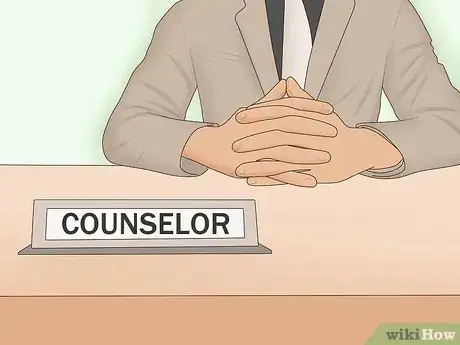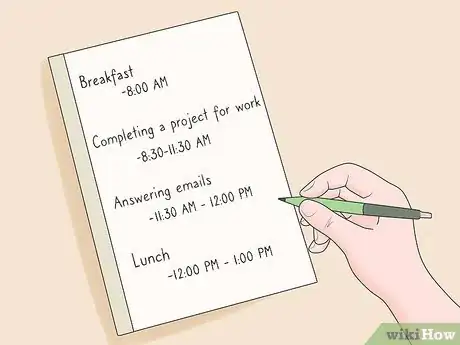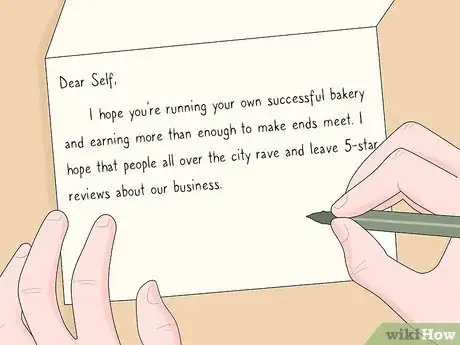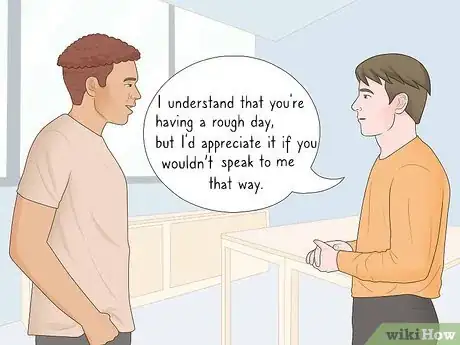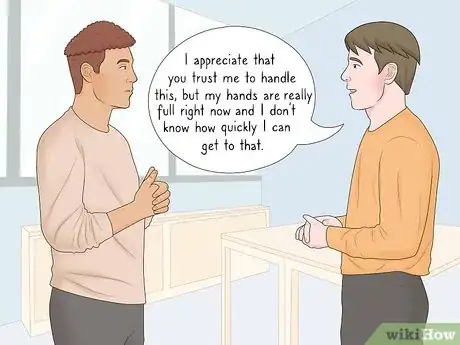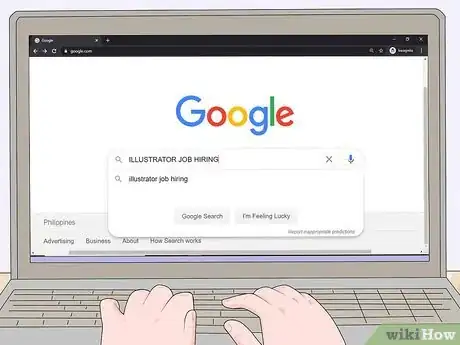This article was co-authored by Guy Reichard and by wikiHow staff writer, Janice Tieperman. Guy Reichard is an Executive Life Coach and the Founder of HeartRich Coaching & Training, a professional life coaching and inner leadership training provider based in Toronto, Ontario, Canada. He works with people to create more meaning, purpose, well-being, and fulfillment in their lives. Guy has over 10 years of personal growth coaching and resilience training experience, helping clients enhance and transform their inner worlds, so they can be a more positive and powerful influence on those they love and lead. He is an Adler Certified Professional Coach (ACPC), and is accredited by the International Coach Federation. He earned a BA in Psychology from York University in 1997 and a Master of Business Administration (MBA) from York University in 2000.
There are 9 references cited in this article, which can be found at the bottom of the page.
This article has been viewed 76,269 times.
It’s really easy to lose track of time, especially if you spend a lot of time on your phone or watching your TV. Making the most out of your life can seem overwhelming, but there’s nothing to be afraid of! Take some time to really think about what you want to do with your life, and if you’ve been living each day to the fullest. With a little planning and TLC, you can start making the most of your time and career.
Steps
Setting Personal Goals
-
1Write down what you want to get out of your life. Think as broadly or specifically as you’d like when you make this list. You may not be able to organize all of your thoughts at once, which is perfectly fine! Instead, start by thinking of more extreme possibilities, then narrowing your thoughts down to more specific preferences. Once you’ve figured out these preferences, you can put your best food forward in figuring out where you want to go and who you want to become.[1]
- This type of thinking can apply to small thinking, like how to organize your desk at work, or it can apply to big thinking, like a long-term career goal.
- For instance, you can start by thinking of something extreme, like: “I want to go skydiving.” After reaching that conclusion, narrow your thoughts down to something like: “I want to do something daring that really gets my adrenaline pumping.” Your concluding thought can be something like: “I want to travel the world as a journalist reporting from areas of conflict.”
- You can also start by thinking something like: “I want to master the piano.” Narrow this down into something like: “I want to be really good at a musical instrument.” You can finalize this into something like: “I’d love to create my own music that people can download and enjoy.”
-
2Respect your personal goals and desires. Don’t dismiss your own hopes and dreams, even if they seem out of reach. A key part of living your life to the fullest is learning how to respect your own thoughts and ideas, regardless of the time or circumstance. Remind yourself that your goals and desires are valid and worthwhile, and that you deserve to live each day to the fullest.[2]
- For example, you can tell yourself something like: “I know that it’s easier to sit around and watch TV all day, but I deserve to spend my day doing activities that I really enjoy.”
- If you have a lot of trouble respecting and loving your own thoughts and ideas, you may want to set up an appointment with a trusted counselor or friend to talk about how you’re feeling.
Advertisement -
3Prepare your daily schedule ahead of time. Create a schedule for your day, regardless of whether or not you have a job. Plan out your day from start to finish, including what you’re going to eat, what activities you’re going to do, and how long each item on your agenda will take. Try to accomplish one item on your list at a time instead of juggling multiple tasks at once. Ultimately, give yourself a sense of direction without overwhelming yourself with too many things at once.[3]
- For instance, you can plan on eating breakfast at 8:00 AM, completing a project for work from 8:30 to 11:30 AM, answering emails from 11:30 AM to 12:00 PM, and then eating lunch from 12:00 PM to 1:00 PM.
-
4Focus on the big picture instead of sweating the small stuff. Don’t get caught up in little mistakes or errors throughout the day—instead, take time to be grateful for the aspects of your life that go smoothly. Celebrate your accomplishments, no matter how they seem, and don’t give any of your energy to the negative parts of your day, like an argument or spilling something on your favorite shirt.[4]
- You’ll get a lot more out of your life if you take time to be happy about all of your accomplishments.
- For instance, you can celebrate something simple, like making dinner for yourself, or spending an afternoon with a good friend.
-
5Stop making excuses for yourself. Try to think about what you can do instead of what you can’t. Instead of making excuses, focus on what you can accomplish. Try to look past the short-term benefits of excusing yourself from something, and focus on the long-term benefits, instead.[5]
- For instance, while it may be easier to stay home and watch TV, you’ll get a lot healthier if you go to the gym instead.
- If you go for a walk instead of making an excuse to take a nap, you’ll feel a lot more productive later on.
Prioritizing Yourself in Your Career
-
1Draft a letter to yourself to figure out your career goals. Think about yourself many years in the future, and where you want to be at that point. Write a note to yourself to figure out where exactly you want to be, and what you want to make out of your future. Don’t hold back—focus on what you want to do, and what you want to accomplish more than anything else.[6]
- For instance, you can write something like: “Dear Self, I hope you’re running your own successful bakery and earning more than enough to make ends meet. I hope that people all over the city rave and leave 5-star reviews about our business.”
- If you have a specific plan for your future, you won’t feel like you’re wasting your life.
-
2Dictate your own decisions instead of giving in to others. Get in the habit of standing up for yourself, even if it isn’t always easy. Remind yourself that your thoughts, feelings, and opinions are just as important as everyone else’s, and that your time is equally as valuable. You deserve to be treated with respect at all aspects of your job, and putting up with poor treatment is a waste of your energy, time, and talents.[7]
- For instance, if someone treats you rudely at work, you can say something like: “I understand that you’re having a rough day, but I’d appreciate it if you wouldn’t speak to me that way.”
- Even if you don’t realize it, when you accept poor treatment from others, you’re wasting your own time.
-
3Create boundaries at your job so you’re not overworked. Let your coworkers and superiors know what you can handle and what you can’t. Don’t spend countless minutes and hours stressing and overworking yourself—instead, be assertive and let others know what you can and can’t handle. If you spend your work week being stressed and unhappy, you’re ultimately filling and wasting those days with negative, unproductive emotions.[8]
- For instance, if a superior or coworker is overloading you with work, say something like: “I appreciate that you trust me to handle this, but my hands are really full right now and I don’t know how quickly I can get to that.”
- Boundaries are important for all aspects of work, like letting your coworkers know when you’re available to have a conversation.
-
4Quit your job if you have another job opportunity. Search online for jobs that really pique your interest and suit your skill set, especially if you’re unhappy in your current job. Don’t spend endless days suffering through a job you’re unhappy with—instead, look for a good opportunity to make a transition into a new career. Once you have a new job secured, you can quit your old position and make a positive change.[9]
- Don’t be disappointed if you can’t find a new job right away. It might take some time before a good job pops up on your horizon.
- You may not find your “dream job” right away, but you can still transition to a career that better suits your interests.
Taking Care of Yourself
-
1Set aside a specific time to relax. Choose a time each day where you don’t have any obligations. Give yourself to sit back, breathe, and do something that you really enjoy. Try to commit to a time where you can really relax and rejuvenate, so aren’t just randomly sitting around and doing nothing.[10]
- For instance, you may find time to relax after you’ve eaten dinner, or when you first wake up in the morning. It all depends on your schedule!
-
2Plan out your free time so you aren’t laying around. Think about your schedule throughout the week, and when you specifically have downtime. Don’t dedicate your downtime to lounging around; instead, think about what you’ll be doing in your free time, even if it’s something relaxing or mindless. Having a plan in place can help you feel more productive, and like you aren’t wasting your own time by laying around and doing nothing.[11]
- For instance, if you have the evenings free after work, you can decide to play video games ahead of time.
-
3Find activities that are satisfying and fulfilling. Explore different hobbies if you have a little trouble filling up your free time. Look into activities like learning a new language, starting a garden, baking tasty treats, painting, and coloring in a coloring book to fill up and enrich your free time. It’s okay if you can’t settle on a new hobby at first—it may take time before something that suits you really well.[12]
- For instance, you may not like the outdoorsiness of fishing, but you may prefer something like solving a jigsaw puzzle or singing a song.
-
4Maximize your free time by multi-tasking. Think about activities you can do at once. One of these activities can be mindless, like going for a walk or run, while the other can be something that you actively enjoy, like listening to music or a favorite audiobook. Look for different areas in your life where you can successfully combine 2 tasks at once without getting confused.[13]
- For instance, you can play a game of tennis while listening to some of your favorite songs.
-
5Ask for support from your loved ones. Let your friends and family members know if you’re going through a rough patch. It’s perfectly normal and valid to feel disappointed in yourself, or like you aren’t doing enough with your time. Don’t get caught up in the details—just focusing on spending time with people who care about you, and remembering that you have a lot to offer to the world, even if it’s at your own pace.[14]
Expert Q&A
Did you know you can get expert answers for this article?
Unlock expert answers by supporting wikiHow
-
QuestionWhat is wasting your life?
 Guy ReichardGuy Reichard is an Executive Life Coach and the Founder of HeartRich Coaching & Training, a professional life coaching and inner leadership training provider based in Toronto, Ontario, Canada. He works with people to create more meaning, purpose, well-being, and fulfillment in their lives. Guy has over 10 years of personal growth coaching and resilience training experience, helping clients enhance and transform their inner worlds, so they can be a more positive and powerful influence on those they love and lead. He is an Adler Certified Professional Coach (ACPC), and is accredited by the International Coach Federation. He earned a BA in Psychology from York University in 1997 and a Master of Business Administration (MBA) from York University in 2000.
Guy ReichardGuy Reichard is an Executive Life Coach and the Founder of HeartRich Coaching & Training, a professional life coaching and inner leadership training provider based in Toronto, Ontario, Canada. He works with people to create more meaning, purpose, well-being, and fulfillment in their lives. Guy has over 10 years of personal growth coaching and resilience training experience, helping clients enhance and transform their inner worlds, so they can be a more positive and powerful influence on those they love and lead. He is an Adler Certified Professional Coach (ACPC), and is accredited by the International Coach Federation. He earned a BA in Psychology from York University in 1997 and a Master of Business Administration (MBA) from York University in 2000.
Executive Life Coach
-
QuestionIs it OK to waste time?
 Guy ReichardGuy Reichard is an Executive Life Coach and the Founder of HeartRich Coaching & Training, a professional life coaching and inner leadership training provider based in Toronto, Ontario, Canada. He works with people to create more meaning, purpose, well-being, and fulfillment in their lives. Guy has over 10 years of personal growth coaching and resilience training experience, helping clients enhance and transform their inner worlds, so they can be a more positive and powerful influence on those they love and lead. He is an Adler Certified Professional Coach (ACPC), and is accredited by the International Coach Federation. He earned a BA in Psychology from York University in 1997 and a Master of Business Administration (MBA) from York University in 2000.
Guy ReichardGuy Reichard is an Executive Life Coach and the Founder of HeartRich Coaching & Training, a professional life coaching and inner leadership training provider based in Toronto, Ontario, Canada. He works with people to create more meaning, purpose, well-being, and fulfillment in their lives. Guy has over 10 years of personal growth coaching and resilience training experience, helping clients enhance and transform their inner worlds, so they can be a more positive and powerful influence on those they love and lead. He is an Adler Certified Professional Coach (ACPC), and is accredited by the International Coach Federation. He earned a BA in Psychology from York University in 1997 and a Master of Business Administration (MBA) from York University in 2000.
Executive Life Coach
-
QuestionWhy do I waste time when I'm super busy?
 Guy ReichardGuy Reichard is an Executive Life Coach and the Founder of HeartRich Coaching & Training, a professional life coaching and inner leadership training provider based in Toronto, Ontario, Canada. He works with people to create more meaning, purpose, well-being, and fulfillment in their lives. Guy has over 10 years of personal growth coaching and resilience training experience, helping clients enhance and transform their inner worlds, so they can be a more positive and powerful influence on those they love and lead. He is an Adler Certified Professional Coach (ACPC), and is accredited by the International Coach Federation. He earned a BA in Psychology from York University in 1997 and a Master of Business Administration (MBA) from York University in 2000.
Guy ReichardGuy Reichard is an Executive Life Coach and the Founder of HeartRich Coaching & Training, a professional life coaching and inner leadership training provider based in Toronto, Ontario, Canada. He works with people to create more meaning, purpose, well-being, and fulfillment in their lives. Guy has over 10 years of personal growth coaching and resilience training experience, helping clients enhance and transform their inner worlds, so they can be a more positive and powerful influence on those they love and lead. He is an Adler Certified Professional Coach (ACPC), and is accredited by the International Coach Federation. He earned a BA in Psychology from York University in 1997 and a Master of Business Administration (MBA) from York University in 2000.
Executive Life Coach
References
- ↑ Guy Reichard. Executive Life Coach. Expert Interview. 19 March 2020.
- ↑ https://www.psychologytoday.com/us/blog/emotional-fitness/201305/8-ways-get-the-most-out-your-life
- ↑ https://www.inc.com/jayson-demers/10-easy-ways-to-become-more-productive-and-less-stressed.html
- ↑ Guy Reichard. Executive Life Coach. Expert Interview. 19 March 2020.
- ↑ https://www.psychologytoday.com/us/blog/the-happiness-project/201303/do-you-make-excuses-yourself
- ↑ https://www.forbes.com/sites/forbescoachescouncil/2018/11/13/11-ways-to-establish-and-then-reach-your-long-term-goals/
- ↑ https://www.forbes.com/sites/margiewarrell/2015/05/17/stand-up-for-yourself-you-teach-people-how-to-treat-you/
- ↑ https://psychcentral.com/blog/7-tips-for-setting-boundaries-at-work/
- ↑ https://www.npr.org/2019/12/30/792426201/want-to-quit-your-job-heres-how-to-do-it-well
- ↑ Guy Reichard. Executive Life Coach. Expert Interview. 19 March 2020.
- ↑ https://www.fastcompany.com/90244574/how-to-stop-wasting-your-life-watching-tv-do-something-worthwhile-with-your-downtime
- ↑ Guy Reichard. Executive Life Coach. Expert Interview. 19 March 2020.
- ↑ https://www.fastcompany.com/90244574/how-to-stop-wasting-your-life-watching-tv-do-something-worthwhile-with-your-downtime
- ↑ https://www.psychologytoday.com/us/blog/emotional-fitness/201305/8-ways-get-the-most-out-your-life
- ↑ https://www.psychologytoday.com/us/blog/emotional-fitness/201305/8-ways-get-the-most-out-your-life
- ↑ https://www.fastcompany.com/90244574/how-to-stop-wasting-your-life-watching-tv-do-something-worthwhile-with-your-downtime


